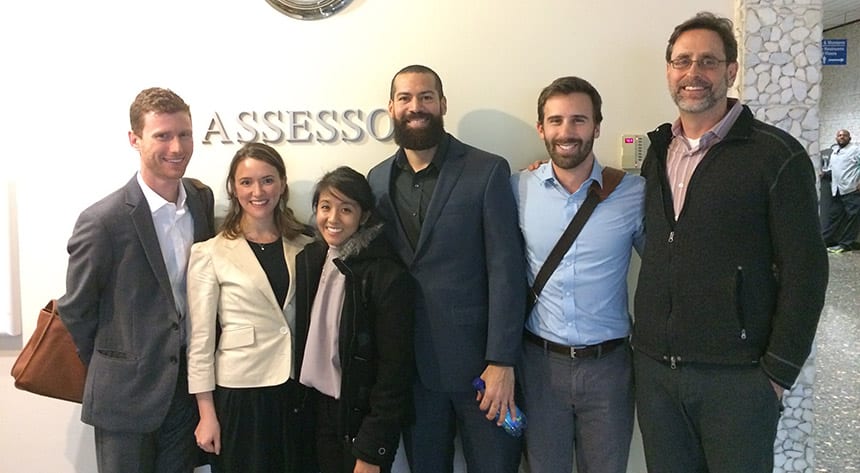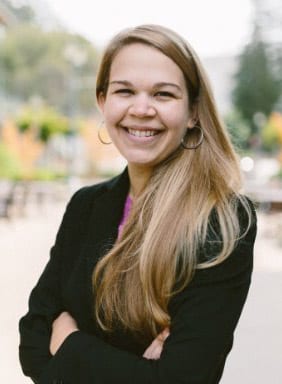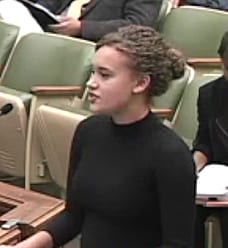
By Andrew Cohen
What started as a local effort to help families overwhelmed by regressive and racially discriminatory juvenile justice fees has blossomed into a national movement. Driving the train: lawyers and law students at the East Bay Community Law Center (EBCLC) who first identified the problem among their clients, and Berkeley Law’s Policy Advocacy Clinic (PAC), whose research shows the practice to be harmful, unlawful and costly.
The clinic’s dogged work has revealed how such fees, often charged illegally, impose hardship on families and generate little or no financial gain for California counties. The fees fall especially hard on low-income families of color, whose children are disproportionately punished in the criminal justice system, resulting in large bills they cannot afford to pay.
Over the past year, PAC’s research has prompted four counties to ban the assessment and collection of all administrative fees against families with children in the juvenile system.
That success fueled momentum for new legislation, Senate Bill 190, which would repeal such fees statewide. The bill cleared its first hurdles at Senate hearings on March 21 and April 4 with bipartisan support, and PAC students are presenting their research findings in Sacramento at each step of the legislative process. Clinic leaders are hopeful the bill will reach Governor Jerry Brown’s desk this summer.
Now—thanks to a new $1.65 million, multi-year grant from the Laura and John Arnold Foundation—PAC will lead a national effort aimed at reforming the assessment and collection of juvenile fines and fees in other states.

“Despite growing attention to the counterproductive impact of court-ordered debt in the criminal justice system, juvenile fines and fees have generally gone under the radar,” said clinic teaching fellow Stephanie Campos-Bui ’14. “We’re thrilled that the Laura and John Arnold Foundation is investing resources to support research that shines a light on the impact of juvenile justice debt for families across the country.”
The grant, which supports PAC’s non-partisan research, analysis and outreach efforts, aligns with the foundation’s mission of improving the lives of individuals by strengthening the nation’s social, governmental and economic systems. Clinic students have begun to conduct research to identify three core states and a network of other states where it makes sense to provide assistance over the next three years.
“This includes analyzing other states’ systems for authorizing the assessment of juvenile fines and fees, speaking with key stakeholders on the ground and gauging interest among potential partner organizations in those states,” said Katherine Buckley ’17.
The grant will also help PAC co-develop a publicly available, web-based policy hub with the Juvenile Law Center for individuals interested in addressing this issue.
Eye-opening data
Last year, PAC’s research report spurred Alameda County to become the nation’s first to eliminate administrative fees against families with children in the juvenile justice system. Santa Clara County and Contra Costa County soon followed suit, relieving more than 10,000 families of millions of dollars in debt. Last month, with technical assistance from PAC, local advocates persuaded Butte County to end juvenile detention fees.
According to the California Attorney General’s Office, youth of color are grossly overrepresented among the tens of thousands placed in the juvenile system each year. They get punished more frequently and harshly; are more likely to be arrested, detained and put on probation; and serve longer detention and probation terms. Criminologists have also recently found that juvenile debt correlates with higher recidivism.
PAC’s research revealed that in Alameda County, families with youth sentenced to average probation conditions were charged $2,861. Yet after costs connected to collecting those fees, the county netted little revenue. What’s more, the average cost for African-American families with youth in the system was $3,438—compared with $1,637 for families of White youth. Latino and Asian-American families also have higher average fee debt.
“Counties charge these fees to families already struggling to maintain stability,” said clinic Director and Clinical Professor of Law Jeff Selbin. “State law says these fees are supposed to help counties recoup costs—they’re not supposed to hurt vulnerable families.”
New report
The clinic’s new policy report highlights these problems and shows how administrative fees undermine the juvenile system’s rehabilitative purpose. For their research, PAC students interviewed dozens of youth, families and other stakeholders in counties across California; surveyed the state’s 58 Chief Probation Officers; filed dozens of Public Records Act requests; and conferred with subject matter experts.

The students found that some counties charge fees that are not authorized by state law and fees for youth found not guilty. Many counties violate federal law by charging families to feed their children in detention while seeking reimbursement from national breakfast and lunch programs for the same meals.
“We have yet to find a fee regime in California that is both fair and cost effective,” Campos-Bui said. “Every county that has taken a close look at its practices in the last year has stopped charging fees.”
Berkeley Law students Hamza Jaka ’18, Tim Kline ’17, Ahmed Lavalais ’17 and Alynia Phillips ’17 and public policy student Abby Ridley-Kerr drafted the new report under the supervision of Selbin and Campos-Bui.
“Jeff and Stephanie make sure we have the guidance we need, then set us loose to share our findings in the county and state legislative processes,” Kline said. “The work can be messy and change direction on a dime, but it’s the real thing.”
Their report calls for repealing laws permitting the assessment and collection of juvenile fees, reimbursing families for payments made on unlawfully charged fees, and maintaining better data in the juvenile system to root out practices that do not serve the system’s goals.
“The purpose of the juvenile justice system isn’t to punish kids—it’s to rehabilitate them and help them get their lives together,” Kline said. “Charging fees to these kids and their families is anathema to that purpose.”
The report notes that 54 of California’s 58 counties charge families at least one of the juvenile administrative fees, including for detention, legal counsel, electronic monitoring, probation supervision, drug testing and investigation reports. The impact is often devastating.
The human toll
Orange County billed Maria Rivera $16,372 for her son’s detention and lawyer. She sold her home to pay more than $9,500 and filed for bankruptcy when the county continued to pursue the debt’s balance. The county only relented after a federal appeals court stepped in to declare the debt dischargeable in bankruptcy.
Los Angeles County billed Sally Stokes more than $1,000 for her granddaughter’s detention and spent nearly $13,000 pursuing the debt from a grandmother living on Social Security benefits—more than 10 times the debt itself. “They were trying to take blood from a turnip,” Stokes told the Los Angeles Times.
Courts have begun to take note. In Rivera’s case, the U.S. 9th Circuit Court of Appeals cited Alameda County’s recent ban on the fees in admonishing Orange County. The court concluded: “We would hope that in the future, the county will exercise its discretion in a way that protects the best interest of minors and society they will join as adults, instead of following a directly opposite and harmful course.”
The clinic’s work has also gained national attention. Last year, The New York Times editorial board pointed to PAC’s research in calling for an end to administrative juvenile fees nationwide. In January, the U.S. Department of Justice cited the clinic’s work in an advisory to local jurisdictions reminding them that juvenile fines and fees can violate youths’ rights and create hardship for their families.
“Most states authorize juvenile administrative fees without considering their impact on either rehabilitation or public safety,” Selbin said. “Our goal—through careful research and on-the-ground partnerships—is to flip the script, so that in three to five years any state that still charges families such fees will be the exception and not the norm.”
Buckley previously spent a year with EBCLC advocating for young people and their families in the juvenile system. EBCLC’s work was the catalyst for the fees project—and for Buckley.
“It was infuriating to see the extreme economic burden falling on poor families who are already being punished in a dehumanizing system,” she said. “I feel strongly about the importance of direct services and advocacy for individual clients, but it also feels good to help efforts for broader reform.”